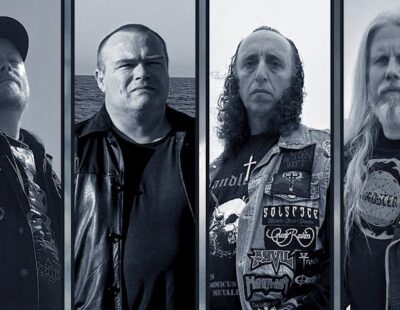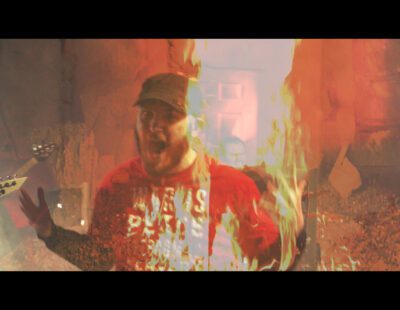This was a week where the heavily hyped albums and hive mind faves were few and far between, forcing a metal critic to – gasp – do some actual digging. And there is indeed some interesting stuff out there, including work by some old German veterans I’d counted out long ago, a children’s deathcore band that just might be growing up, and a really cool black metal nugget from Greece.
Betraying The Martyrs, Phantom (Sumerian): There are flashes of inspiration on this latest album by the French kiddiecore band, moments that cleverly combine deathcore and the symphonic death metal of Fleshgod Apocalypse, but there’s always so much going on that it winds up feeling far too busy for its own good. And the less said about the obnoxious, overly loud sound of this record, the better.
Demonic Resurrection, The Demon King (Candlelight): The Mumbai band is back with another helping of blackened death metal, and this record shows some decent growth, its melodic passages starting to sound more confident. The singing lacks the kind of strength needed to effectively serve as a counter to the harsher, more extreme parts, but a track like “Facing the Faceless” shows that these guys are on the right track.
Grave Digger, Return Of The Reaper (Napalm): A week after Judas priest’s 17th album came out, Germany’s grave Digger is releasing its own 17th album, yet on this continent you won’t see anywhere near the same excitement. Strictly a European phenomenon with only a small cult following over here, gravel-gargling singer Chris Boltendahl and his bandmates have been churning out albums with regularity, so much so that it’s been easy to take it all for granted. Of course, it didn’t help that the band’s last few albums have motored along complacently, but it’s a very pleasant surprise to find Return of the Reaper so energetic, impassioned, and catchy, stacked with fist-pumping metal anthems from start to finish. There’s no reason anyone who enjoys Priest’s Redeemer of Souls shouldn’t feel the same about this record. To ignore it would be foolish.
Illuminate Me, I Have Become A Corpse (Tragic Hero): If you play this sort of Converge-derived hardcore and can’t even come close to competing with the real thing, what’s the bloody point?
Kult of Taurus/Erevos Aenaon, Born of Fire, Forged By Death (Forever Plagued): This split release is one that’ll interest fans of underground black metal, as the two Greek bands have joined forces. Kult of Taurus come through with four raw, savage, fleeting takes on their black metal sound, while Erevos Aenaon is a revelation, these four tracks evoking the primitive fury of early black metal, executed with awe-inspiring power.
Lazer/Wulf, The Beast of Left and Right (Retro Futurist): It’s awfully lazy to quote a band’s press release, but the Athens, GA band’s explanation for this album is so convoluted that it’s best to quote directly: “We wrote the album to be a palindrome – that is, it’s the same backwards and forwards. The album is in two distinct halves, Left and Right, and we wrote them to be the “opposite” of each other. On the full 9-track version that’s on CD, track 1 uses the exact same chords, riffs and drum tracks as track 9 but one is major and the other is minor; track 2 lyrically opposes track 8; track 3 uses the rhythm of track 7 backwards (we even recorded the guitars for track 3 backwards and reversed them to the version that’s on the album); track 4 uses all the same drum parts and melodies as track 6 but the song structure is backwards, and 5 is the center track – no song opposes it, but it incorporates parts of the songs on either side of it.”
Good lord. But does it work? I suppose if you’re an obsessive student of music theory you’ll get a huge nerdy kick out of the whole structure of the thing, but what’s far, far more important is one’s instinctual reaction to the music. Personally, I find it at times jaw-dropping in its dexterity, coming across as more playful than arch, but still at times these compositions leave me grasping for any hook to latch on to, only to have that happen intermittently. The musical chops on display are undeniable, but epic tracks like the “Choose Again” pieces are in sore need of hooks.
Novembers Doom, Bled White (The End): The ninth album by the Chicago death/doom mainstays often treads very familiar territory, but it’s when the music strays from the usual well-worn path that the album gets truly interesting. Three great examples are “Just Breathe”, “Clear”, and “The Memory Room”, which step away from the harsher elements to make room for more sumptuous melodies, and the end result approaches the melancholy majesty of vintage Katatonia. I always wish Novembers Doom would explore this side of their music more fully instead of merely dabbling, but as it stands this is another reliable, enjoyable effort by a consistently good band.
Pelican, Arktika (self-released): The Chicago instrumental post-metalers have always been a very strong live act, and that’s been proven on this recording of a show they did in St. Petersburg, Russia last year. The energy is palpable on these tracks, which, typical of Pelican, ebb and flow with a level of confidence that seems to benefit immensely from the spontaneity that live performances bring. Zach Smith premiered the album last week, and I highly suggest you give it a listen.
Suicide Silence, You Can’t Stop Me (Nuclear Blast): The death of Suicide Silence vocalist Mitch Lucker was horribly sad – as reprehensible as driving while drunk is, nobody deserves to die at such a young age – so a few more eyes than usual are on the popular Los Angeles deathcore band as they try to rebound. As I always say, extreme metal screamers are a dime a dozen and easy to replace, but Suicide Silence did something brilliant, taking on Eddie Hermida from longtime deathcore stalwarts All Shall Perish, and on this fourth album you cannot deny his charismatic presence is a massive, massive improvement. Coupled with songwriting that, for the first time ever from this band, shows genuine growth and competence, this is one of the more pleasant surprises of the summer. Considering that I absolutely loathed this band’s previous work, this is very high praise.
Unaussprechlichen Kulten, Baphomet Pan Shub-Niggurath (Iron Bonehead): Although it’s not exactly the most exciting death metal album of the year, these Chileans at least deserve credit for creating a sound that dips into vintage thrash as well as doom, which gives the music some welcome contrast and respite from all the blistering extremity, which at times can be as impenetrable as the band’s ridiculous name.
Volumes, No Sleep (Mediaskare): If you play this sort of Meshuggah-derived “djent” music and can’t even come close to competing with the real thing, what’s the bloody point?
Not metal, but worth hearing:
Weird Al Yankovic, Mandatory Fun (RCA): It’s a testament to the demented talent of the man that Weird Al has been able to make his parody gimmick last this long. It’s not exactly easy to keep up, with pop music being so ephemeral in this day and age, but the man comes through with renditions of recent hits that range from all-out groaners (Lorde’s “Royals” turned into an ode to tinfoil) to instances where the parodies turn out better than the originals (the hilarious “Tacky”, the witty “Word Crimes”). Of course, there’s the usual polka medley that’s always a blast, but the real fun is had on his original compositions, whether mimicking Crosby, Stills & Nash (“Mission Statement”) or coming through with an absolutely inspired Pixies imitation (“First World Problems”), all pulled off with incredible versatility by Yankovic’s crack band of 30-odd years. It’s all so very stupid, but joyously so, and further proof that nobody skewers – and sometimes improves – pop music like Weird Al.





